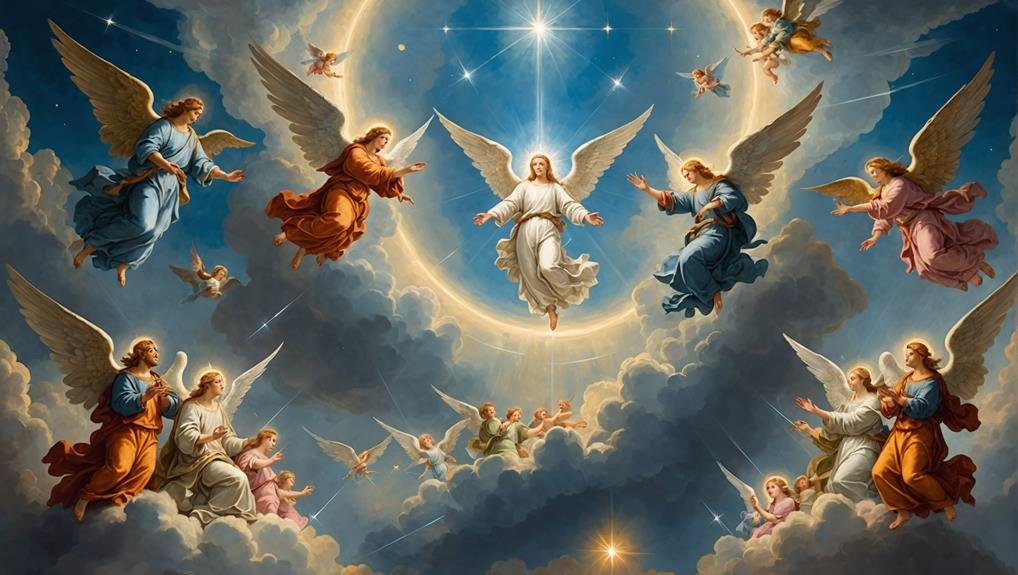When you explore the age-old question of whether angels possess free will, you’re stepping into a lively debate where theological perspectives clash. On one side, proponents argue that angels, like Lucifer, demonstrate free will through their choices, even rebelling against divine authority. Conversely, others suggest angels’ inherent righteousness and unwavering obedience imply a lack of true autonomy, set apart from human moral struggles. This raises intriguing questions about the nature of angelic beings and their roles in the cosmic order. Are they truly free agents or merely instruments of divine will? The implications are profound and worth pondering.
Key Takeaways
- Angels’ rebellion, including Lucifer’s fall, illustrates their capacity for choice and free will against divine authority.
- The consistent righteousness of angels raises questions about their autonomy and potential lack of free will.
- Angels’ ability to make choices implies moral responsibility and autonomy aligned with or divergent from divine will.
- Perfect obedience to God may suggest that angels lack free will and are bound to predetermined actions.
- As intelligent beings, angels possess the capacity for independent decision-making, impacting their eternal paths and responsibilities.
Biblical References to Angels
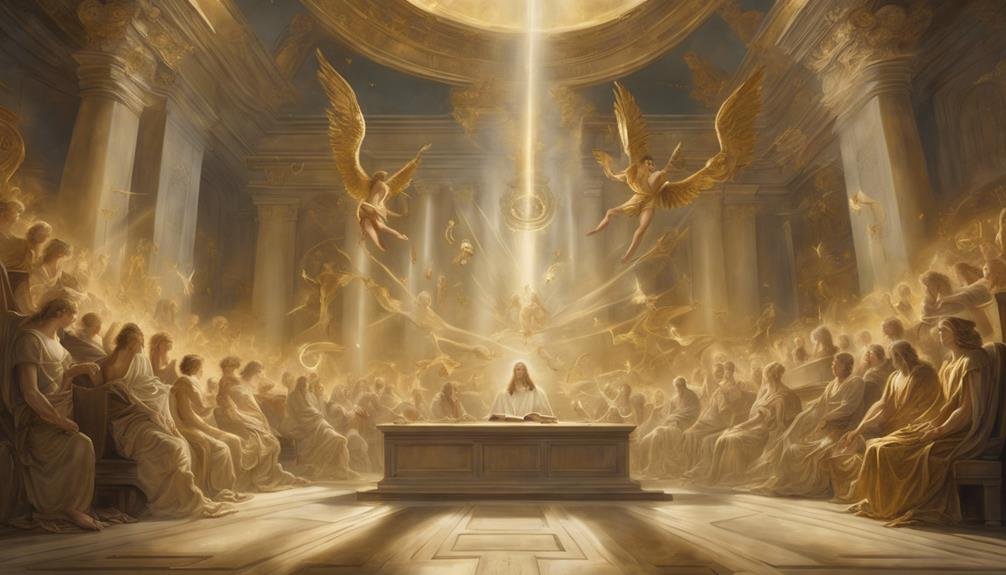
Angels are mentioned over 250 times in the Bible as celestial beings, underscoring their importance in Scripture. When you explore biblical references, you’ll find angels fulfilling various roles, most notably as messengers of God. They appear to prophets, delivering divine messages that guide, warn, or enlighten. Their presence in these narratives highlights their significant role in connecting the sacred with the earthly domain.
You might wonder about their nature and the concept of free will. The Bible portrays angels as having emotions, intelligence, and will, suggesting they possess free will. This is most evident in the account of Satan and other fallen angels who chose to rebel against God, exercising their free agency. Such narratives hint at the intricate nature of angels, who, despite their heavenly origins, can make choices that diverge from divine will.
Definition of Free Will
When you think about free will, you’re considering the nature of making choices without being forced. This autonomy means you’re responsible for your actions, which can lead to positive and negative consequences. Understanding this concept is essential, especially when examining how angels might choose to love and serve God.
Nature of Free Will
Exploring the nature of free will, we find it represents the capacity to make choices free from external coercion or deterministic forces. This freedom is vital for any being’s ability to serve or act according to their desires and intentions. When you consider the concept of free will, it becomes clear that it encompasses more than mere decision-making; it involves the profound capacity for choosing to love or to act in alignment with one’s values and beliefs. This ability to choose freely differentiates autonomous beings from those reacting to external stimuli.
Free will is intimately connected with the idea of autonomy in decision-making. You can decide based on your thoughts and feelings without being coerced into a particular path. This autonomy makes free will an essential component of moral responsibility and accountability.
Understanding angels’ potential for free will allows a deeper examination of their choices and actions. If angels possess this capacity, then their actions in serving or loving might truly reflect their own volition rather than being the mere execution of a predetermined plan. In this way, free will offers a foundation for exploring the moral dimensions of any being’s actions.
Autonomy and Responsibility
The concept of free will is the cornerstone of autonomy and responsibility. Free will is about making choices that aren’t coerced, allowing individuals or beings to act based on their desires and beliefs. This ability plays a pivotal role in determining one’s accountability for one’s actions. Just like humans, angels are believed to possess this gift of free will. This means they can choose to serve God faithfully or rebel against Him, thereby sinning.
When angels exercise their free will, they’re acting autonomously. This autonomy grants them the freedom to make decisions but also comes with moral responsibility. Their choices aren’t made in isolation; they carry significant weight and consequences. This ethical responsibility underscores their role as moral agents within religious narratives. By choosing to serve God, angels affirm their commitment to divine plans. But if they decide to sin, they become accountable for their rebellion.
Understanding angels’ free will provides insight into their moral agency. It emphasizes the importance of autonomy and responsibility when making choices that align with or deviate from God’s will.
Choices and Consequences
Angels frequently face choices that define their eternal paths, highlighting the essence of free will. This ability to choose without coercion is a hallmark of their existence. You see, their ability to sin, demonstrated by Satan’s rebellion and the fallen angels, underscores that angels possess free will. These choices aren’t trivial; they have eternal consequences that forever shape their destinies.
When angels decided to rebel against God, they fully exercised their free will. This rebellion wasn’t just a momentary lapse but a calculated decision with far-reaching implications.
For those angels who chose to serve God, their decision led to an existence aligned with divine will, demonstrating the perfection of freedom in making choices that align with their nature.
For fallen angels, the choice to sin resulted in separation from divine grace, illustrating the irrevocable nature of their decision. The eternal consequences of their actions highlight the responsibility that comes with free will.
In your understanding of angelic free will, consider how their ability to see and choose clearly reflects their profound freedom, which comes with irrevocable and eternal outcomes.
Angels’ Ability to Choose
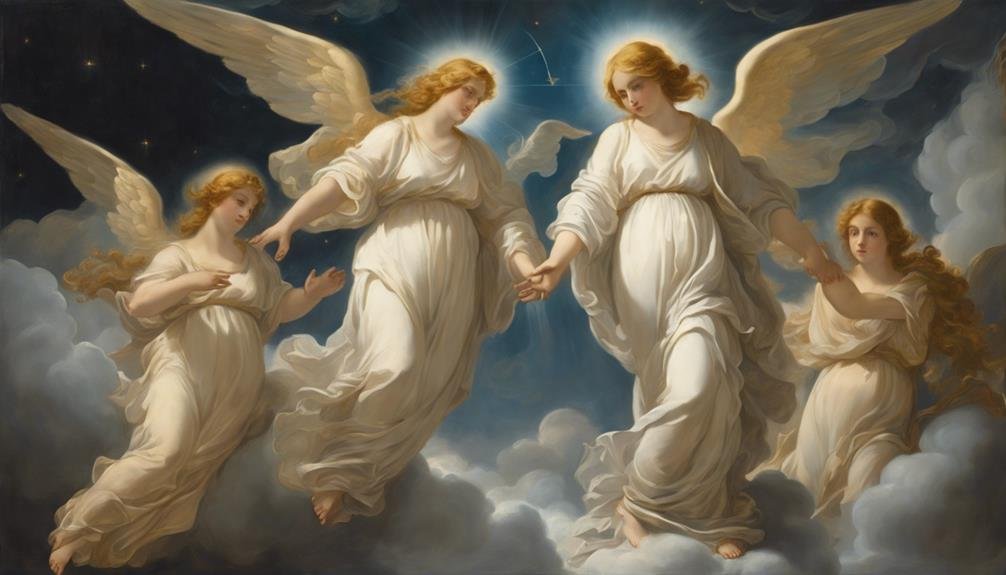
Imagine a world where beings possess the profound ability to choose between love and rebellion. This is the reality for angels, who have the power to make choices that define their eternal destinies. They can choose to love and serve God, or they can choose to sin and rebel against Him. This capacity to make choices suggests that angels are truly free, possessing a freedom that allows them to fulfill their purpose fully.
Consider these key aspects of angels’ ability to choose:
- Irrevocable Decisions: Once an angel decides to love or rebel, the consequences are eternal, highlighting the weight of their choices.
- Rebellion Consequences: One-third of angels chose to follow Satan in rebellion, illustrating the reality of their free will in action.
- Fulfillment Through Good Choices: True freedom lies in the ability to choose good, allowing angels to fulfill themselves by aligning with divine will.
Angels’ choices aren’t just fleeting decisions but are grounded in profound eternal implications. The essence of their freedom is their capacity to choose the good and fulfill themselves, reflecting their unique position in the cosmic order.
Evidence of Angelic Rebellion
You’re about to explore the pivotal moment when one-third of angels, led by Satan, chose to rebel against God, as documented in Revelation 12.
This disobedience highlights their free will and sets the stage for understanding the eternal consequences they now face.
Angelic Disobedience Instances
In the domain of celestial beings, the notion of free will comes to the forefront when considering instances of angelic disobedience. One of the most significant examples is Lucifer’s choice to rebel against God. This rebellion wasn’t solitary; it involved leading one-third of the heavenly hosts into defiance, resulting in them becoming fallen angels. This act of angelic disobedience is well-documented in Scripture, providing a vivid demonstration of the free will exercised by these celestial entities.
When you think about these events, several key points emerge:
- Lucifer’s Rebellion: As the most notable instance of angelic disobedience, Lucifer’s insurrection against divine authority highlights the capacity for choice among angels.
- Fallen Angels: The expulsion of these beings from heaven is direct evidence of the consequences faced by those who chose to rebel, underscoring the reality of free will.
- Scriptural Evidence: The documentation of Satan’s rebellion demonstrates that angels share free will, allowing them to choose between allegiance and rebellion.
These instances collectively remind us that angels, like humans, can choose their path, even if it leads to disobedience.
Rebellion Consequences Explored
The consequences of angelic rebellion are profound and far-reaching, illustrating the serious implications of exercising free will in defiance of divine order. When one-third of the angels, led by Satan, chose to rebel against God, it set off a cosmic conflict that continues to ripple through existence. This act demonstrated that angels possess free will, a powerful ability that, when misused, can lead to devastating outcomes.
The rebellion divided the once-unified celestial beings and highlighted the stark contrast between good and evil forces in the universe.
Due to their rebellion, the fallen angels faced defeat at the hands of Michael and the loyal angels. This battle underscored the strength and righteousness of those who remained faithful. Yet, the ultimate consequence for the rebellious angels was separation from God and eternal damnation, a stark reminder of the price of defying divine authority.
Through this lens, the angelic rebellion becomes a cautionary tale about the consequences of free will, serving as an example of how choices rooted in rebellion can lead to irreversible and eternal ramifications.
Scriptural Rebellion Narratives
Scriptural narratives provide compelling evidence of angelic rebellion, illustrating their capacity for independent will. In Revelation 12:4, you read about Satan, originally known as Lucifer, who led one-third of the angels in a bold rebellion against God. This act of defiance underscores the notion that angels possess free will, choosing to act contrary to God’s desires.
The fall of Lucifer is further elucidated in Isaiah 14:12-15, where self-will and pride are cited as the catalysts for his downfall. These passages suggest that angels, like humans, are endowed with independence and personal decision-making capacity.
Consider these points:
- Lucifer’s Rebellion: This choice to lead a revolt highlights the exercise of free will among angels.
- Fall from Grace: Angels’ actions, diverging from divine will, indicate their independence and autonomy.
- Involvement in Human Affairs: Scripture recounts various instances where angels engage with humanity, reflecting their ability to choose their roles and actions.
The narrative of angelic rebellion paints a picture of beings capable of making choices, aligning or misaligning with divine intentions. This exploration of scriptural evidence strengthens the argument that angels operate with a degree of free will and independence.
Holy Angels and Sinlessness
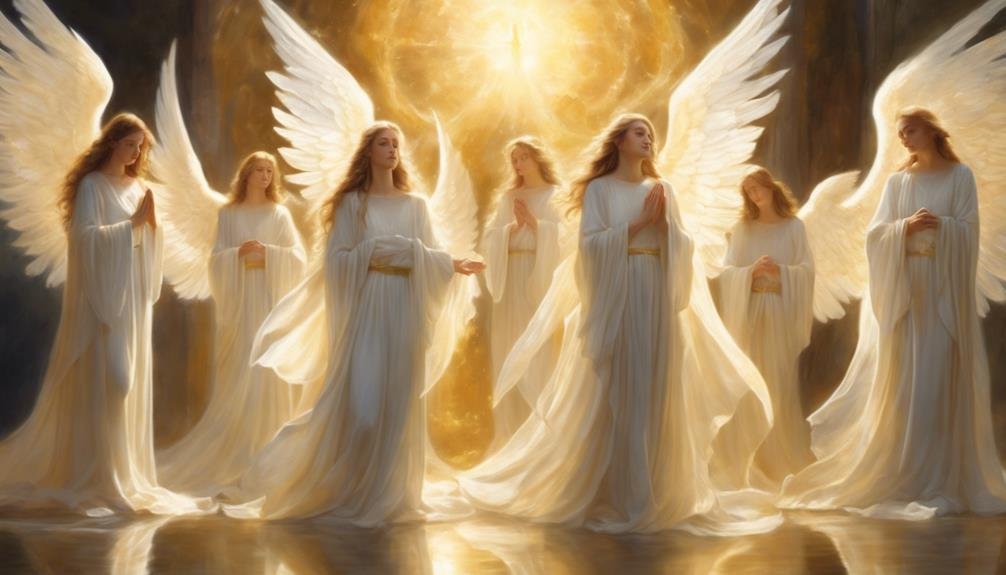
Angels are fascinating beings, often depicted in Scripture as sinless due to their unwavering choice to follow God’s will. As sinless beings, they consistently choose righteousness, an attribute that stems from their possession of free will. This might surprise you, as free will often suggests the possibility of choosing otherwise. However, holy angels demonstrate that possessing the ability to choose doesn’t inherently lead to sin. Instead, they exercise their free will by consistently aligning with divine commands, setting them apart from other creatures.
You might wonder how angels maintain this sinless state. Unlike humans, angels aren’t inclined toward sin or rebellion. Their nature doesn’t wrestle with the same internal conflicts that often lead humans astray. Instead, they exist harmoniously with God’s will, and their choices reflect this perfect alignment.
In the eternal state, these angels reside in the holy city of God, where they’re depicted as perpetually sinless beings. This setting symbolizes their ultimate commitment to righteousness.
Understanding angels’ sinlessness offers a glimpse into their unique relationship with God. It highlights their steadfast dedication to choosing good, confirms their divine purpose, and demonstrates the power of aligned free will.
Angels Compared to Humans
While holy angels remain sinless, humans grapple with the challenges of their fallen nature. You might wonder how angels and humans compare, especially regarding free will and moral choices. Angels aren’t corrupted by sin, which naturally inclines them toward righteousness. Despite having free will, angels consistently choose the good, showcasing their perfect obedience to God.
In contrast, humans face a constant battle against their innate sinful tendencies, which can cloud their judgment and decision-making abilities. This ongoing struggle to be morally good is fundamental to human existence. Despite their imperfections, humans also possess free will, enabling them to make choices that can be either morally good or not.
Here’s how angels and humans compare:
- Choice: Angels possess the ability to choose but always opt for the good, while humans often grapple with this.
- Nature: Angels are inherently righteous, whereas humans have to endeavor for righteousness.
- Obedience: Holy angels consistently obey God, highlighting their freedom to choose the good without deviation.
Understanding these differences might lead you to reflect on angels’ remarkable nature and consider humans’ unique challenges in pursuing moral goodness.
Eternal State of Angels
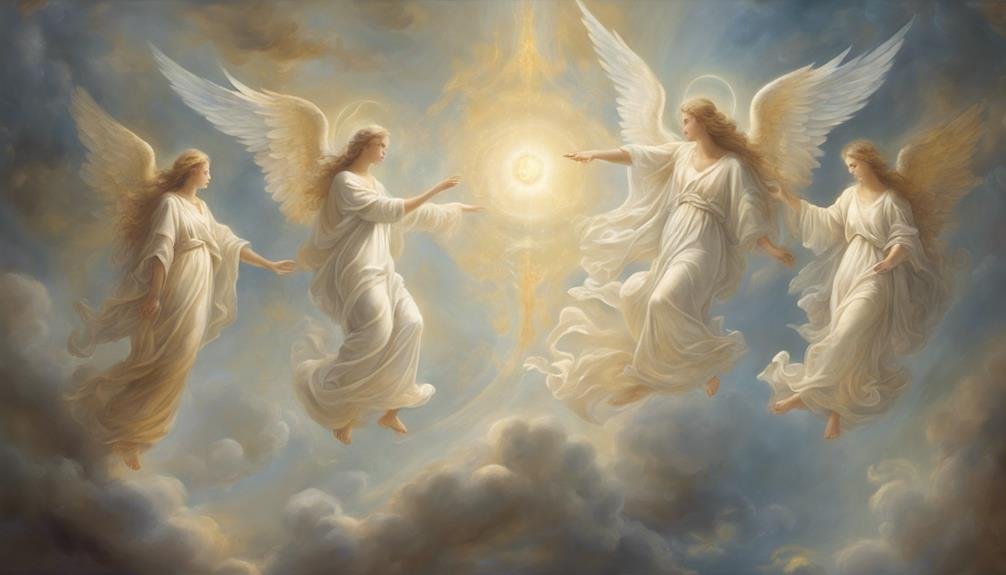
In the eternal state, holy angels shine as sinless beings, embodying purity and righteousness in the sacred city of God. They exist in a domain where mourning, crying, and pain are absent, highlighting their perfect holiness. These angels are confirmed as sinless entities, reflecting their eternal flawless purity. Their existence in the sacred city signifies a life free from evil, where only those embodying righteousness can enter. The absence of sin in the eternal state underscores their sanctified nature.
Here’s a brief overview:
| Aspect | Eternal State | Sinless Beings |
|---|---|---|
| Presence | Sacred City of God | Confirmed accordingly |
| Emotional State | No mourning or crying | Reflects purity |
| Nature | Eternal righteousness | Embody holiness |
| Admission | Only sin-free beings | No evil permitted |
| Significance | Symbol of perfection | Eternal sanctity |
You can see how these sinless beings emphasize a life of holiness and demonstrate the ultimate purity that aligns with their eternal state. Their presence in the sacred city is a testimony to their righteous nature, setting a divine standard for holiness. Such an existence exemplifies the ultimate culmination of purity in the eternal state, where angels reflect the highest form of sanctity and righteousness.
Theological Implications
The theological implications of angels’ free will are profound, underscoring their ability to make irrevocable choices regarding their devotion or rebellion against God. This capacity to choose reflects the depth of their freedom and positions them uniquely within the divine order. When angels decide to serve God, they fulfill their purpose and uphold their positions of authority within the celestial hierarchy. This choice highlights the perfection of their moral decision-making, allowing them to fully realize their potential without the vulnerability to sin that plagues humanity.
However, the stark reality is that some angels chose to follow Satan, showcasing the gravity of free will. Their decision led them away from God’s light, emphasizing the eternal consequences of their actions. This underscores the infinite nature of their choice, as angels, unlike humans, see the consequences of their decisions with perfect clarity due to their divine nature.
Consider these theological aspects:
- Angels’ choices are eternal, with no opportunity for repentance.
- Their perfect nature allows for informed decisions without moral imperfection.
- The rebellion of some angels illustrates the serious implications of free will.
Understanding these implications can deepen your appreciation of the theological discussions surrounding angels and their unique role in the cosmic order.
Debating Angels’ Autonomy
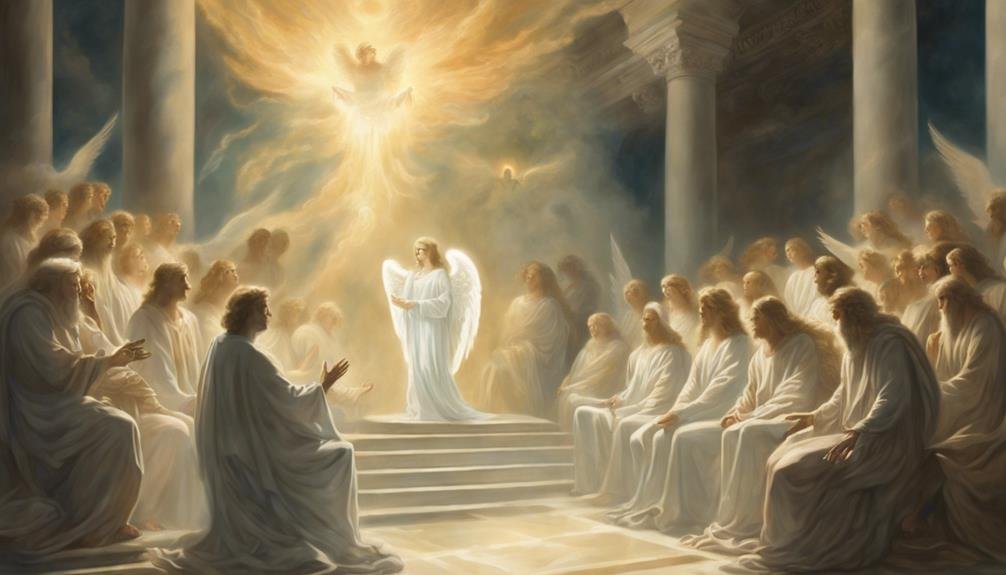
Many scholars and theologians explore the complex issue of angels’ autonomy, particularly focusing on their capacity for free will. The classic example of Lucifer’s rebellion against God is a strong argument for angels possessing free will. Lucifer’s fall wouldn’t be possible if angels were merely automatons incapable of acting against God’s will. This defiance suggests autonomy, allowing angels to choose independently of divine command.
You might wonder how angels’ free will compares to that of humans. While both are believed to be able to choose, angels’ choices seem to carry a different weight and consequence. Humans often struggle between good and evil, guided by moral dilemmas and personal desires.
In contrast, angels may operate under a different framework as spiritual beings, but their actions aren’t always perfectly aligned with God’s will, further supporting their autonomy.
Debating angels’ autonomy involves interpreting Scripture and understanding their role in human affairs. Despite the lack of consensus, the ongoing discussion highlights the complexity of defining the extent of angels’ free will, leaving room for diverse perspectives and interpretations.
Conclusion
You’ve explored both sides of the debate on whether angels have free will. On the one hand, their ability to choose and instances of rebellion, like Lucifer’s, suggest autonomy. Conversely, their inherent righteousness and obedience point to a predetermined state. Comparing angels to humans highlights differences in moral struggle and decision-making. Understanding angels’ free will can deepen your theological insights, but it remains a complex mystery, inviting further reflection and exploration.
FAQs
What are the arguments for angels having free will?
The argument for angels having free will is based on the idea that some angels chose to rebel against God, as seen in religious texts like the Bible. This rebellion, led by Lucifer, suggests that angels can make choices independently. Additionally, some theological perspectives argue that free will is necessary for true worship and loyalty, which means that angels, like humans, would need free will to serve or reject divine authority genuinely.
Key Points:
- Rebellion led by Lucifer implies choice and free will
- Free will allows for genuine worship and loyalty
- Angels may need freedom to choose their actions
What are the arguments against angels having free will?
Arguments against angels having free will suggest that angels are created solely to serve God and are bound by divine purpose rather than individual choice. Some believe angels act purely on divine command and do not experience desires or inclinations outside their roles. In this view, angels’ actions are guided entirely by God’s will, and they are incapable of rebellion or disobedience.
Key Points:
- Angels are created for service, not individual choice
- Actions are thought to be aligned with divine command
- Lack of independence will prevent disobedience
How do religious texts interpret the concept of free will for angels?
Religious texts vary on this topic, with the Bible referencing both obedient and fallen angels. The story of Lucifer’s fall in Christianity implies that angels had some degree of choice. However, other interpretations suggest that only certain angels were given free will, while others remain completely obedient. Islamic teachings generally emphasize that angels act solely under God’s will, with no inclination toward disobedience.
Key Points:
- The Bible suggests some angels chose to rebel (e.g., Lucifer)
- Some believe only certain angels have free will
- Islamic teachings often depict angels as obedient and without free will
